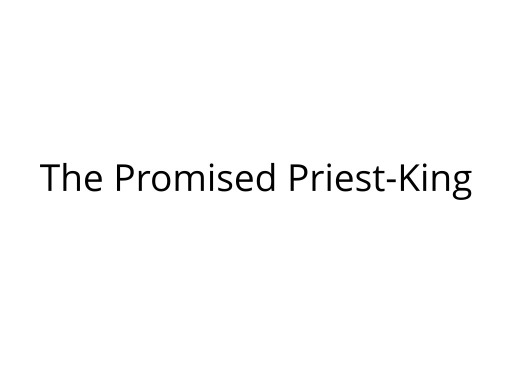Psalm 110

The Promised Priest-King of Zion (and His Victory over Evil)
Intro: An Alternate Reality
A Promise
The LORD says to my lord:
“Sit at my right hand
until I make your enemies
a footstool for your feet.”
14 So the LORD God said to the serpent, “Because you have done this,
“Cursed are you above all livestock
and all wild animals!
You will crawl on your belly
and you will eat dust
all the days of your life.
15 And I will put enmity
between you and the woman,
and between your offspring and hers;
he will crush your head,
and you will strike his heel.”
A Promised One
17 “I see him, but not now;
I behold him, but not near.
A star will come out of Jacob;
a scepter will rise out of Israel.
He will crush the foreheads of Moab,
the skulls of all the people of Sheth.
Now the Philistines gathered their forces for war and assembled at Sokoh in Judah. They pitched camp at Ephes Dammim, between Sokoh and Azekah.
2 Saul and the Israelites assembled and camped in the Valley of Elah and drew up their battle line to meet the Philistines.
3 The Philistines occupied one hill and the Israelites another, with the valley between them.
A champion named Goliath, who was from Gath, came out of the Philistine camp. His height was six cubits and a span.
5 He had a bronze helmet on his head and wore a coat of scale armor of bronze weighing five thousand shekels;
David said to the Philistine, “You come against me with sword and spear and javelin, but I come against you in the name of the LORD Almighty, the God of the armies of Israel, whom you have defied.
46 This day the LORD will deliver you into my hands, and I’ll strike you down and cut off your head. This very day I will give the carcasses of the Philistine army to the birds and the wild animals, and the whole world will know that there is a God in Israel.
47 All those gathered here will know that it is not by sword or spear that the LORD saves; for the battle is the LORD’s, and he will give all of you into our hands.”
48 As the Philistine moved closer to attack him, David ran quickly toward the battle line to meet him.
49 Reaching into his bag and taking out a stone, he slung it and struck the Philistine on the forehead. The stone sank into his forehead, and he fell facedown on the ground.
A Promised King
2 The LORD will extend your mighty scepter from Zion, saying,
“Rule in the midst of your enemies!”
3 Your troops will be willing
on your day of battle.
Arrayed in holy splendor,
your young men will come to you
like dew from the morning’s womb.
4 The LORD has sworn
and will not change his mind:
“You are a priest forever,
in the order of Melchizedek.”
The Promised Priest-King
The Promised Priest-King and His Victory Over Evil
When you were dead in your sins and in the uncircumcision of your flesh, God made you alive with Christ. He forgave us all our sins,
14 having canceled the charge of our legal indebtedness, which stood against us and condemned us; he has taken it away, nailing it to the cross.
15 And having disarmed the powers and authorities, he made a public spectacle of them, triumphing over them by the cross.
Since the children have flesh and blood, he too shared in their humanity so that by his death he might break the power of him who holds the power of death—that is, the devil—
15 and free those who all their lives were held in slavery by their fear of death.
because Jesus lives forever, he has a permanent priesthood.
25 Therefore he is able to save completely those who come to God through him, because he always lives to intercede for them.
26 Such a high priest truly meets our need—one who is holy, blameless, pure, set apart from sinners, exalted above the heavens.
27 Unlike the other high priests, he does not need to offer sacrifices day after day, first for his own sins, and then for the sins of the people. He sacrificed for their sins once for all when he offered himself.
